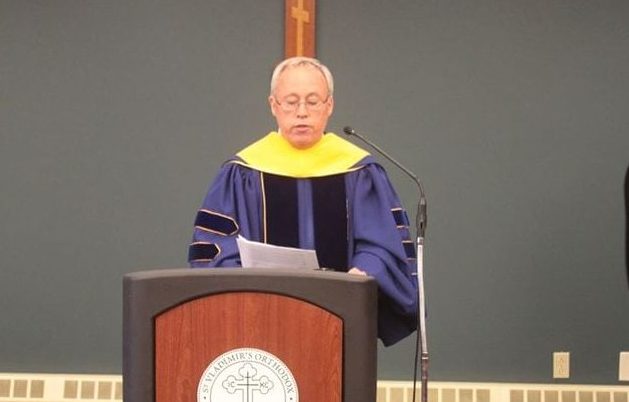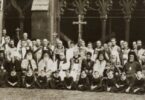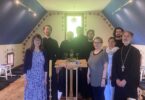From the Editor
Dr. Paul Meyendorff was the Father Alexander Schmemann Professor of Liturgical Theology at St. Vladimir’s Orthodox Theological Seminary from 1987 to 2016. Dr. Meyendorff’s father, Archpriest John Meyendorff, was born into a Russian noble émigré family in 1926 in France. In 1948 he graduated from the St. Serge Theological Institute and in 1958 defended at the Sorbonne his doctoral dissertation on St. Gregory Palamas. In 1959 the Meyendorffs, including Paul (b. 1950), came to New York, where Fr. John became a soulmate of another alumnus of St. Serge Theological Institute – Fr. Alexander Schmemann (graduated in 1945). Fr. John held teaching posts at St. Vladimir’s Orthodox Theological Seminary and Fordham University. Following in the steps of Sir Dmitri Obolensky, Fr. John emphasized a church dimension in the so-called Byzantine Commonwealth. Unfortunately, after the death of Fr. John in 1992, there was no Byzantinist who would be dedicated on his scale to the analysis of the Byzantine theology and ecclesiastical history. While at St. Vladimir’s, Fr. John was interested in fostering relations with intellectual Orthodox circles in the Soviet Union and then new Russia, something which went out of focus at St. Vladimir’s after he passed away.
Fr. John was all for the implementation of the territorial principle of organization of Church life in America, defending the foundation of a local Orthodox Church of this land. It is interesting how Russian noblemen of German descent, whose parents did not belong to the “caste of Russian Levites” became authoritative key figures in the Russian ecclesiastical life of the diaspora. At the court trial challenging ownership of the Church of the Kazan Icon of the Mother of God in Sea Cliff, NY in 1971, the OCA was represented successfully by Fr. Alexander Schmemann, while Protopresbyter George Grabbe was contending the ROCOR position there. In 1982, Fr. John Meyendorff represented the OCA diocese of Eastern Pennsylvania, while Bishop Mark (Arndt, of no Russian ethnic background) successfully defended the right of the parish of St. John the Baptist in Mayfield, PA to change ecclesiastical jurisdiction.
Having retired in Washington State, Dr. Meyendorff continues there to keep himself busy. I remember Dr. Meyendorff’s kindness during my studies in the Master’s in Theology program at St. Vladimir’s in 2001-2004. The idea of this interview was discussed with Dr. Paul Meyendorff long ago and has materialized now with the help of the communication software Zoom. I believe now, when we do not have “to keep our wagon-train in a circle” we, finally, can begin to match different versions of our common history against each other and I hope that this interview serves this cause.
Deacon Andrei Psarev,
May 17, 2020
So, when I’m thinking about Father Alexander Schmemann and about Father John Meyendorff, somehow it comes to my mind that Father Alexander was more casual about the Russian Church Abroad. I am referring to his article “The Church and Church Structure,” where he defends what he believes is the canonical foundation for the Paris Exarchate and for the Northern American Metropolia but he’s not bitter. And there is some kind of bitterness in Fr. John Meyendorff. I looked at the afterword to Lev Regel’son’s book, Tragediia Russkoi Tserkvi (Tragedy of the Russian Church, Paris 1977) and he is quite harsh, I guess, on the Russian Church Abroad. So that’s something I meant to ask you to comment on.
I don’t remember in our conversations any kind of bitter sense. There was a strong critical sense, kind of what he saw as the kind of sectarian tendencies within the ROCOR, seeing itself as the true Russian Orthodox Church and so on. And he would comment, for example, that’s it’s easy to criticize when you’re inside, but when you leave and then to criticize those who stayed and had to suffer the consequences – that he saw as inappropriate.
I think part of it can be explained for deeply personal and family reasons. I mean, we lived and he did most of his career at St. Vladimir Seminary right across the Hudson river from Nyack, which is kind of an important center for the Russian Church Abroad connected with the Tolstoy Foundation and the active parish and school there. He had very many close relatives in Nyack, I mean first cousins, aunts, uncles and so on, most of whom were in the ROCOR. When he would attend funerals, for example, at the church, family members at the church in Nyack, I mean the priest there would, when he would cense the church, walk around him, avoiding him very deliberately. Especially after autocephaly, after 1970, when the OCA, the Metropolia, then the Orthodox Church in America, kind of made peace with Moscow and received its autocephaly. I mean that was seen as a betrayal by especially the more ardent members of ROCOR.
He had one first cousin, for example, who stopped talking to him completely, broke off all relations after this happened, seeing my father somehow as a traitor. So, I think any kind of personal sense could be explained by that, although I must say in personal conversation that would not have been for him the main factor. He was an objective historian and a scholar, so I think his primary criticism of ROCOR was mostly on its position defending monarchy, its sectarian tendencies, its rejection of ecumenical conversations, for example. Especially in the later period of ROCOR; I don’t think that was the case early on. So, in Paris he might have felt differently about the Russian Church Abroad.
Like when I asked Fr. Alexander’s wife, Matushka Juliana (d. 2017), “
When did you for the first time realize that there was a Russian Church Abroad?” she responded that there was not any jurisdictional tension in Paris and people of various political creeds would congregate around the St. Serge Theological Institute. So, probably Fr. John did not necessarily feel in Paris as he felt in the States.
Well, the tension was acute in the States, I think especially in the 70’s and 80’s, I would say. But I mean for the most part, he had very good relations with his relatives and most of those relatives kind of went freely between churches of ROCOR and Metropolia or OCA. I mean his close cousin, Sophie Koulomzin, for example, was very active in the church school in Nyack, for example. But then she would regularly come to church at St. Vladimir’s Seminary where she would receive Confession and Communion. So, for the most part on a personal level, people moved freely back and forth and there wasn’t the tension. I think perhaps it’s because of my father’s position within the Metropolia and the OCA that sometimes those relations got a little tenser.
Alright, no, I mean that explains. So, because he was also an editor of the official periodical for the OCA, The Orthodox Church, right? And he worked also for the administration in Syosset. I don’t think that the Russian Church Abroad was close to the top of his interest or writings.
In general, no. I mean, he was not polemical by nature and his academic interests were in Russia, in Church History, in patristics – his work on Gregory Palamas early on. And his involvement, I think, where the relations with ROCOR became an issue was precisely in Church affairs. I mean, in kind of defending the position of the Metropolia in the conversations with the Moscow Patriarchate and so on, and the creation of the autocephaly.
So, beyond that, I mean he clearly saw the OCA, the Metropolia as the future of the Orthodox in America; his vision of the Church was a local Church in America. So, he, and in fact his family, already in France, they were certainly Russian by culture, but they were not monarchists and they kind of wanted to find an Orthodoxy in whatever culture they found themselves in. And so especially when my father came to America, I mean his focus was really on the life of the Orthodox Church in America and the Metropolia, which was not exclusively Russian; in fact it was not primarily Russian. Most of the high Russian immigration that came after the Russian Revolution ended up in the ROCOR.
So that was kind of, other than kind of personal family life as relatives and so on; his own interests and focus were really on kind of the life of the local church in America. The life of St. Vladimir’s Seminary, his involvement in representing the Orthodox Church in the ecumenical movement and as Head of the External Relations Department for the Metropolia, then the Orthodox Church in America.
I remember years ago something that probably triggered the whole idea of having this interview, that I read your piece. Please do correct me because my memory does not necessarily serve me well. Something related to the OCA Diocese of the South. I think the Russian Church Abroad was somehow involved – that was probably maybe 2005 or 2006, something like that.
Are you referring possibly to an interview that I gave to a journalist in Dallas?
Yes. That’s sounds right, yeah.
Yeah, it was an unfortunate situation where I made a remark that was kind of intended at a particular context but then was totally misrepresented in another context. He was an American journalist from Dallas who was trying to understand what ROCOR was. And I used an analogy which obviously fell flat, that ROCOR is to the Orthodox Church the way that Bible-built fundamentalists are to mainline Christian churches. More conservative, very literal in their interpretation of the Typikon, the liturgical services, very much adhering to 19th-century Russian practices and so the way it came across obviously was taken as an insult by the representatives of the Russian Church Abroad.
It was not meant as an insult; I was trying to explain kind of culturally the phenomenon and so I apologize if that was offensive in any way. (Obviously, when you give an interview to a journalist, they kind of love the dramatic statements and that’s how it came across.) I apologize if I offended anyone.
it’s good we have sorted this out and that this explanation is available. Because I hope I’m not going by those definitions as you’ve just described and have been most of my life in the Russian Church Abroad. Another question that I had in mind (it doesn’t really relate to Russian Church Abroad) but I just wonder, I thought it’s a good opportunity to ask this question. What is your take on last year’s events in Paris when the churches of the Russian Tradition in Western Europe rejoined the Moscow Patriarchate?
Well, some of them did; not all of them.
Correct, yeah.
It’s a very unfortunate situation. I kind of lament the fact that Constantinople simply abolished the Exarchate because it put the Churches there in a very difficult situation. I mean, there were those clearly who favored kind of restoring or returning to the jurisdiction of the Moscow Patriarchate. I don’t know what percentage that is; if it’s half or not, I really haven’t followed it that closely. There were others who wanted to preserve their identity, realizing that after 100 years they no longer shared kind of the cultural identity with the Moscow Patriarchate. With their strong theological developments at St. Serge and then later at St. Vladimir’s, so it’s split. In fact, what was a coherent group split into different factions. It split families in the very same way that the split between ROCOR and the Evlogian church did in the 30’s. I see it as very unfortunate. I am glad that the Moscow Patriarchate has allowed them to maintain kind of their own separate structure and identity. I think that helps but the result is unfortunate; I mean really a split in anger and divisiveness within that Church that was very fragile to being with.
Thank you very much and now I also, probably the last question regarding this year’s anniversary, which marks the 50th anniversary of the American autocephaly. I understood that Father Alexander Schmemann expected that, with time, it will be recognized. But somehow it hasn’t been unanimously recognized. Are you still enthusiastic about this autocephaly or what are your thoughts you might share with us, reflections of yours?
I would argue that the Orthodox Church in America remains important and significant because of the vision that it has for a united pan-ethnic, local church in North America. I think the OCA continues to stand for that vision. It’s unfortunate that the climate in recent years has kind of moved away from that.
Back in the 60s, everybody was talking about a local united Church. Nowadays the tendency within the Assembly of Bishops, for example, is for every Church, every jurisdiction to kind of maintain its strong ethnic identity and in fact this has only accelerated in recent years. And it’s unfortunate, the situation is status quo; the Orthodox Church in America continues to exist.
It, along with the Antiochian Archdiocese of North America, are the Churches that attract the most converts because they consider themselves very much local Churches with a mission to America. So, it has really changed, I mean the character of the Church is very different from what it was back in the early 70’s when it was founded. Fortunately, the tensions that immediately arose after the autocephaly have settled down; every Church considers the Orthodox Church in America to be a canonical church and it is in communion with all of the other local Churches, even if they don’t recognize the autocephaly. So, I think that is the situation that will continue for, I think, the foreseeable future.










